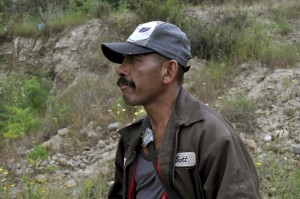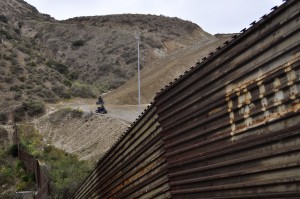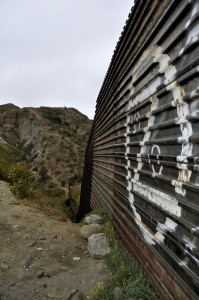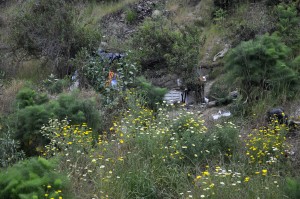 Today I hung out with a guy named Mario along the border wall near the footbridge at Los Laureles Canyon. He was hiking up the path from the culvert carrying a bolero kit, and I laughed and asked him if he gets much business shining shoes out here along the wall. He smiled and explained that he shines shoes over across the road in Los Laureles, and he had just picked up a box of Ramen noodles for 2 pesos in the local neighborhood market.
Today I hung out with a guy named Mario along the border wall near the footbridge at Los Laureles Canyon. He was hiking up the path from the culvert carrying a bolero kit, and I laughed and asked him if he gets much business shining shoes out here along the wall. He smiled and explained that he shines shoes over across the road in Los Laureles, and he had just picked up a box of Ramen noodles for 2 pesos in the local neighborhood market.
I explained that I was taking photos of the border wall, and showed him a spot covered with drawings and names and messages. One of my favorites says, “Ez mi ultima Bes que cruso De MoJADO. It’s my last time I will cross as a wetback.”
Mario was fascinated. “Ando mucho aqui pero nunca lo he visto este,” he told me. I walk along here a lot, and I’ve never noticed these drawings before,” reaching out to touch a tiny scratched drawing of a man wearing sunglasses. Tiene años de edad, esta enmohecido. It’s old, it’s rusty, Mario remarked, and I replied, “Yeah, it’s probably been there for at least ten years.”
And as I showed him more markings, we sat down to talk. We talked for a couple of hours, about the economy and how hard it is to make a living these days and all the bad presidents back to Salinas de Gortari, how they just rob the people and give back nothing. The police had grabbed him one day, taken his birth certificate from Guerrero and torn it up, so even though he’s a citizen, he still gets harassed all the time now. The only good president was Benito Juarez, Mario concluded. I laughed. Damn, that was a long time ago!
He told me he can make about 200 pesos a day in Tijuana, doing odd jobs working for bars, picking up rocks at construction sites. Basic work, and fine for a young guy. “But, I asked, “what about a 60-year-old man? “This is a huge problem in Mexico,” Mario explained. “El Chapo Guzman con todos los milliones que tiene, no pueden dar nada a los ancianos?” With all the millions that El Chapo Guzman has, he can’t give anything to the elderly? “Ni los gobiernos. Lo que quiere es tener el dinero para ellos. Yo pago mis impuestos, y no me dan nada.” Nor the government, all they want is to have money for them. I pay my taxes, but they don’t give us anything.
On the ridge, we could hear the buzzing noise of the border patrol on their ATVs, three flying monkeys circling up above.  The cloudy weather and fog in the morning is what migrants love for crossing, and as we talked, three guys passed by us, also waiting for the right conditions. Up on the hill we could see two other people tucked under a tree, watching the border patrol down below them.
The cloudy weather and fog in the morning is what migrants love for crossing, and as we talked, three guys passed by us, also waiting for the right conditions. Up on the hill we could see two other people tucked under a tree, watching the border patrol down below them.
There’s a huge gap in the border wall here where some old World War II bunkers are still lodged into the ground.  Here near the huge Zeta on the wall, two historic sets of border infrastructure meet and create a gap: sixty-year-old soldiers’ bunkers to stand guard against the once potent threat of Japanese invasion from the Pacific and the latest in 21st-century surveillance systems, ground motion sensors, floodlights, and more walls. I asked about crossing where the wall ends, and one of the guys passing by us explained that the sensors in the ground make it impossible to walk around that area.
Here near the huge Zeta on the wall, two historic sets of border infrastructure meet and create a gap: sixty-year-old soldiers’ bunkers to stand guard against the once potent threat of Japanese invasion from the Pacific and the latest in 21st-century surveillance systems, ground motion sensors, floodlights, and more walls. I asked about crossing where the wall ends, and one of the guys passing by us explained that the sensors in the ground make it impossible to walk around that area.
Down on the path below the migrants have rigged up a shower with a garden hose connected to a city water pipe. Here you can drink some fresh water, wash your clothes, and then cross through the culvert. But once you get over, you have to run like crazy so you don’t get caught right away.
Nobody was going to be able to cross today, the guys had concluded. There were way too many border patrol agents out on patrol.
We talked about the new trade agreement that Obama was working out with Colombia, and how it was just like NAFTA–a plan that would crush the farmers and force them off their land. Mario and I talked about farming, how my grandparents used to farm, and how in the 1980s most of my dad’s side of the family had lost their farms to big corporations. How NAFTA crushed Mexican farmers by offering government subsidies to US corporate farms, and pushing cheap corn from the United States into the Mexican market. “Does Mexico need corn from the US?” I asked. “Of course not.” Mario reminisced about Guerrero, how much he missed farming, the seasons of planting and harvest. He used to plant corn, low-tech farming with an ox-drawn plow. But slowly, it just cost too much to buy the seed, the fertilizer, to buy the feed for the oxen. I felt like I was talking to my cousins back in Minnesota.
Before I left for home, Mario showed me a little house they had rigged up in the canyon where they cook, and find shelter.  He asked me if I could please take a picture so that people could see how some people are living. He liked it that I was taking pictures of the markings on the wall–to show that people here are just like anybody, a person who likes to draw, a person who has a family. “Somos seres humanos como todos.” We are human beings just like anybody, he said.
He asked me if I could please take a picture so that people could see how some people are living. He liked it that I was taking pictures of the markings on the wall–to show that people here are just like anybody, a person who likes to draw, a person who has a family. “Somos seres humanos como todos.” We are human beings just like anybody, he said.
We shook hands as I left, and I asked him if any narcos or cartels controlled this area, like the areas further east where migrants get kidnapped and held for ransom.
No, he told me. “Nadie tiene control de esta tierra. Ni la policia, ni los narcos, ni un grupo criminal. Tenemos todos nosotros derecho de estar aqui.”
No, he said. Nobody controls this area. Not the police, not the narcos, not any criminal group. We all have the right to be here.
